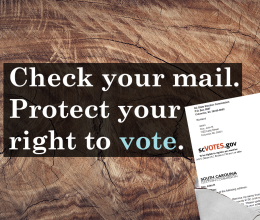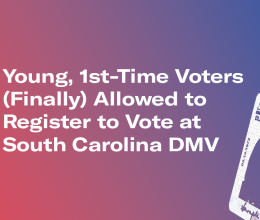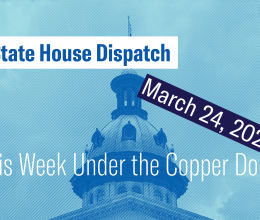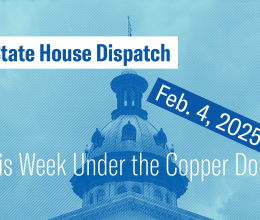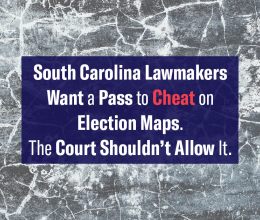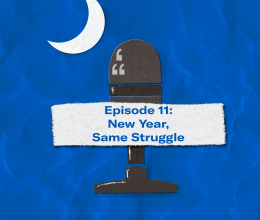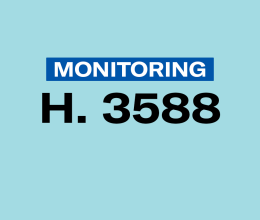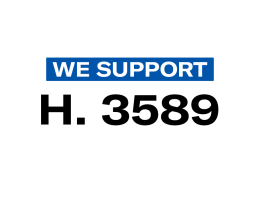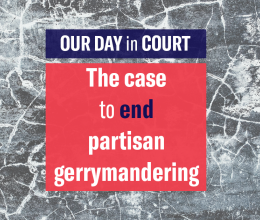
The following is adapted from testimony that Advocacy Strategist Matthew Butler delivered on Jan. 25, 2024, to the Constitutional Laws Subcommittee of the South Carolina House Judiciary Committee. The subcommittee was considering a raft of bills related to elections and voting rights – some quite helpful, some quite harmful.
The subcommittee voted to give a favorable report to two of the bills, H. 4589 (Municipal Election Protests) and H. 4590 (Early Voting Hours). The ACLU-SC did not take a position on the first bill but advocated in favor of the second. The other bills before the committee (agenda PDF here) did not receive a vote on Tuesday morning as the committee reached its time limit.
At the ACLU of South Carolina, we envision a just South Carolina where We the People means all of us. In other words — and I wish we could claim this bumper sticker but can’t — a place where y’all means all.
Voting is the cornerstone of our democracy and the fundamental right upon which all our civil liberties rest. Dr. King said that the arc of the moral universe bends towards justice, and we see this in the history of our republic most succinctly in the expansion of the franchise. Suffrage in South Carolina, with similar laws in other states, began in 1790 as the exclusive purview of free white men, 21 years of age with a residency in the district of at least two years, owning a specified quantity of land for at least six months and having paid a specific tax prior to the election in question.
Through war and strife the franchise was given to the formerly enslaved, considered property, now citizens via the 14th and 15th Amendments. Women would receive suffrage in 1920 with the 19th Amendment, and the nationally standardized age of 18 for participation in state and federal elections became the law in 1971 thanks to the 26th Amendment, with many laws, acts, and court decisions in between.
However, as the saying goes, history does not repeat itself but rhymes. Viewed appropriately in a negative context, these rhymes are the push back, the retrogression as certain parties and sects, recognizing a loss of power due to the expansion of suffrage, seek to claw back access or make it more difficult to retain position. Think Jim Crow. Like a tide ebbing and flowing, this particular story continues.
Today with near-universal suffrage, when analyzing whether a voting bill fits within the ACLU’s vision for South Carolina, I ask myself: Does this bill seek to further include or exclude South Carolinians from voting? How does this policy expand or erode access to the ballot? Does this act encourage more voters to participate or discourage them from casting a ballot?
The bills we support
The ACLU Of South Carolina supports passage of bills H. 4022 & H. 4590 as they are currently written.
H. 4022 (Instant Runoff Voting) has a dual positive effect on the franchise and participation by 1) reducing the cost to municipalities that may not have large budgets for elections, and 2) eliminating the need of run-off elections which burden election offices and voters via the 14-day time constraint — not to mention this is a proven form of election practice in multiple domestic and foreign allied jurisdictions.
H. 4590 (Early Voting Hours) proposes giving the hardworking people of this state additional time to exercise their fundamental right to vote during the declared early voting period, expanding the hours of availability at these early voting centers to 7:00 p.m. This is especially important in areas where voters may have to travel a greater distance to reach the designated early voting center.
We ask that you support these bills as written.
The bills we do not support
And now to the problematic. The ACLU of South Carolina does not support the following proposed bills: H. 4259, H. 4260, H. 4261, and H. 4591. We ask that you do not pass them out of subcommittee.
H. 4259 – the so-called Hand Count Audit Act – is born from the conspiratorial notion that our elections lack integrity and are replete with fraud. This bill creates a solution where no demonstrable problem has ever existed in modern South Carolina elections history. Contrary to what the bill supposes, this bill does not increase security in our elections systems. Nor is it fiscally sound: Relying on the General Assembly to provide funding at its discretion equates to yet another unfunded mandate. The bill would also allow third-party private funding of election audits, which would likely create or maintain a cycle of misgiving and mistrust in elections integrity where none existed before.
H 4260 – the so-called Voter Access and Transparency Act – creates additional barriers to the hardworking citizens of this state by repealing early voting, which has been successful in engaging and increasing electoral participation. It creates a burden on the elderly and disabled by requiring an oath of compliance with those restrictions in order to vote curbside from their vehicle. It rescinds the rights of South Carolinians 65 and older to cast an absentee ballot by virtue of their age. It creates an unfunded mandate for at least three counties to perform elections via a paper ballot, which are to be hand-marked and subsequently counted by hand in this calendar year as a “pilot” program.
Section 7-13-870, while intended to allow any citizen to engage in observation of the entire voting process, creates an undue burden on volunteer or understaffed and under-resourced county and municipal elections offices, and it is likely to lead to concerns regarding voter intimidation by allowing these citizen observers to stand 5 feet away from a voter throughout the voting process.
H. 4261 – the so-called Clean Voter Roll Act – contains provisions that would impinge on the privacy of the citizens of the state. For example, the executive director of the State Election Commission would be required to provide free of charge to any qualified elector a list of all voter registration cards with a photograph of the elector. It would create yet another unfunded mandate by requiring county election commissions to maintain the voter rolls.
H. 4591 (Ranked Choice Voting Ban) conflicts with other legislation this committee is considering today, in this same hearing. This form of voting has many advantages as previously noted. We urge you not to support this legislation.
We do not see any particular cure for these proposed bills and ask that you simply vote them down and report them as unfavorable.
To read more about our work advancing democracy in the courts and legislature, including our Supreme Court case challenging a racial gerrymander, check out our Democracy & Voting Rights page.

